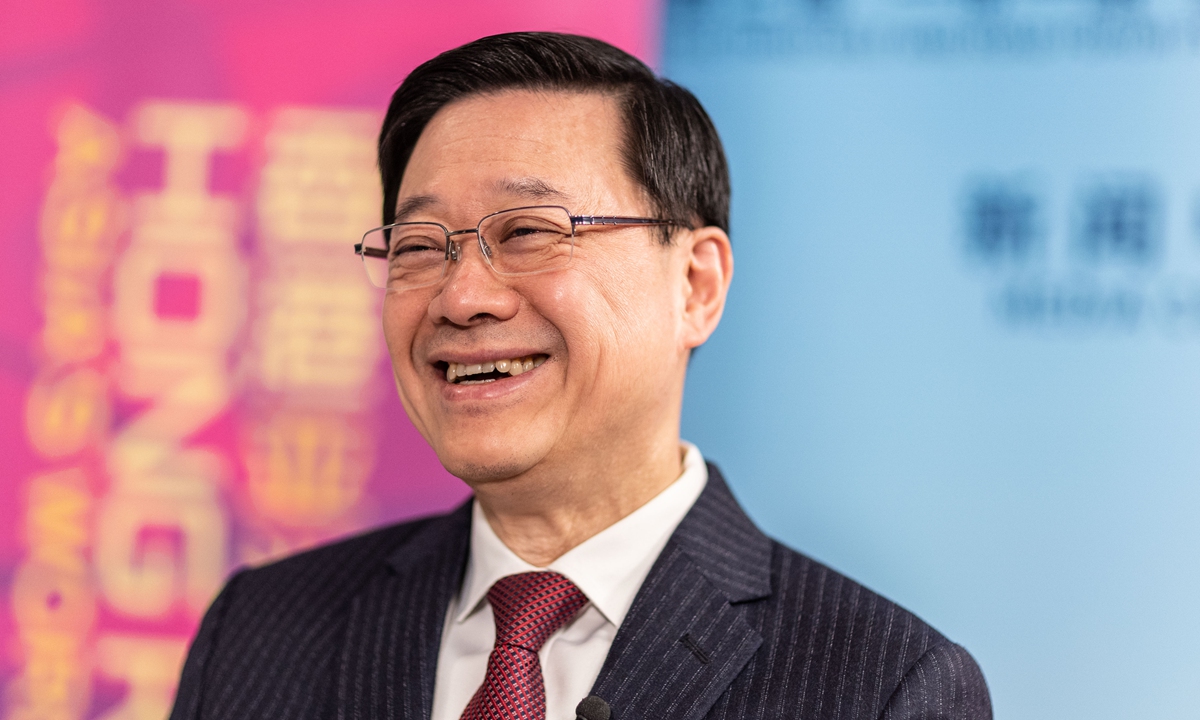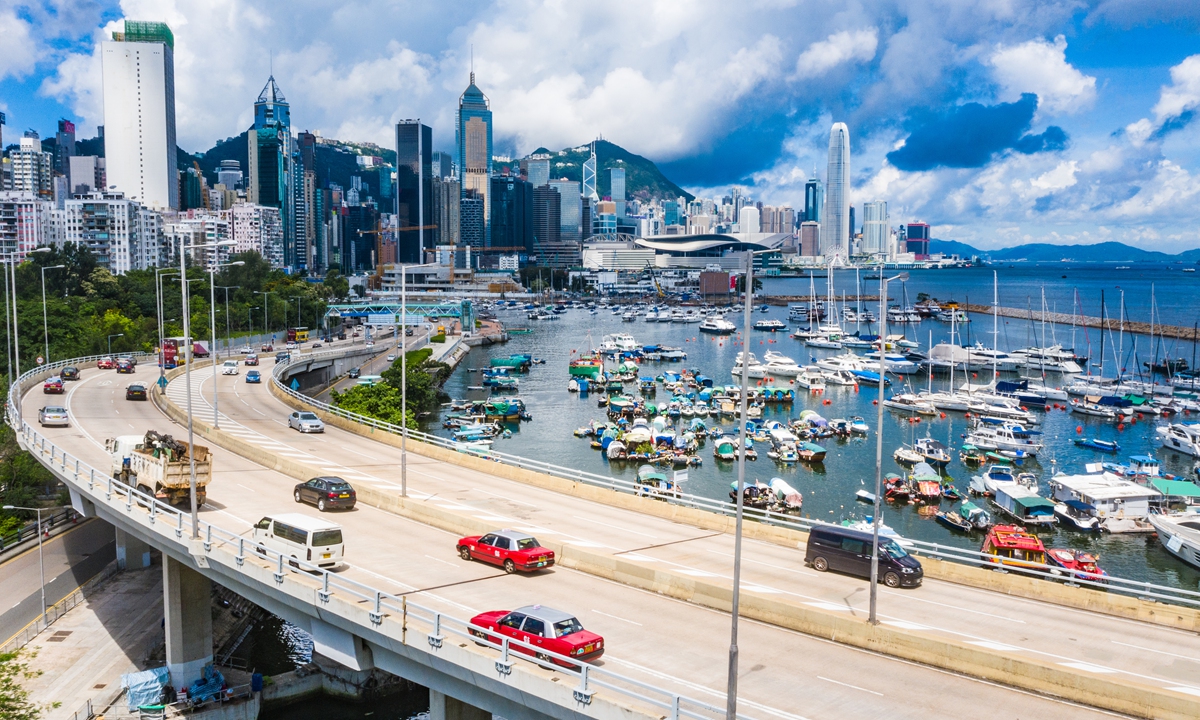Editor's Note: Hong Kong Special Administrative Region (HKSAR) Chief Executive, John Lee Ka-chiu (Lee), led a high-level delegation of 70 people to participate in the third Belt and Road Forum for International Cooperation held in Beijing from October 18 to 19. At the forum, he invited entrepreneurs to Hong Kong to set up belt and road offices. After the forum, he sat down with the Global Times (GT) reporters Xie Wenting and Bai Yunyi for an exclusive interview, sharing his insights on Hong Kong's role in the BRI and Hong Kong's strengths on the global stage. Lee also touched on the "competitive role" of the Hong Kong-Singapore relationship, noting that as long as the "pie" of development is made big enough, everyone can also get a larger share.

Hong Kong Special Administrative Region Chief Executive John Lee Ka-chiu Photo: Li Hao/GT
GT: You led a high-level delegation of 70 people to Beijing on your latest visit to attend the third Belt and Road Forum for International Cooperation, including several high-ranking government officials as well as individuals from the business, academic, and scientific communities. What was the consideration behind this? What is Hong Kong's role in the Belt and Road Initiative (BRI)?
Lee: I hope to use this platform of the forum to better promote Hong Kong and seek business opportunities. Many of our delegates have also established personal connections with entrepreneurs from various regions, giving them the opportunity to personally introduce Hong Kong's advantages and services, which will be more persuasive.
Hong Kong is a participant, promoter, and beneficiary of the BRI. In the joint construction of the BRI, Hong Kong has its own unique advantages. We boast the position of "eight centers," namely, an international financial center, an international trade center, an international shipping center, and an Asia-Pacific international legal and dispute resolution service center, as well as four emerging centers: An international innovation and technology center, a Chinese and foreign cultural and art exchange center, an international aviation hub, and a regional intellectual property trading center. I believe that Hong Kong can play its role in promoting financial connectivity, attracting international investment, and promoting the internationalization of the Chinese currency renminbi (RMB).
GT: We noticed that not long ago you visited three Southeast Asian countries: Singapore, Malaysia, and Indonesia. How do you evaluate the prospects for cooperation between Hong Kong and Southeast Asian countries under the framework of the BRI? Which are the areas that hold the greatest potential? In the past, people have often said that Hong Kong is a "bridge" between the East and the West. In the future, do you think Hong Kong will play a similar role between the Chinese mainland and Southeast Asia?
Lee: Hong Kong has a unique status granted by the central government and the One Country, Two Systems policy is implemented in the city. As one of the few cities in the world that can concentrate both China's advantages and international advantages, we are very lucky, and should therefore make good use of this advantage.
First, Hong Kong can help enterprises in the Chinese mainland go global, including in terms of financing, introducing talents, and scientific and technological cooperation. We can give full play to Hong Kong's functions as an international city. This is the "capital" we have accumulated over the years.
Second, Hong Kong attaches great importance to regional cooperation and hopes to have good relations with our neighbors. The ASEAN is Hong Kong's second-largest trading partner, after the Chinese mainland. This is why one of my two official trips this year was to the three ASEAN members, and I will also take time to visit other states.
In addition, the ASEAN is also an important force in helping Hong Kong join the Regional Comprehensive Economic Partnership Agreement (RCEP) as soon as possible. I am very happy that when communicating with ASEAN states this time, many of them expressed their support for Hong Kong's joining of the RCEP. In the future, we will continue to promote regional cooperation with the ASEAN.

An aerial view of the urban scenery of Hong Kong Special Administrative Region, China Photo: VC
GT: Many people view Singapore as Hong Kong's "competitor" and believe that Singapore has the potential to replace Hong Kong as Asia's international financial center. What's your opinion on this view? Will Hong Kong be replaced by Singapore? Are Hong Kong and Singapore in competition, or do they have more room for complementarity and cooperation?Lee: Hong Kong and many places have dual competitive and cooperative relationship. Competition is a good thing. Only with competition can we make progress. Healthy competition is beneficial. In fact, I have a very good relationship with Singapore's leadership. We often discuss how there is a lot of room for cooperation and development.
I think the most important thing (for a city) is to compete with itself. Competing with competitors is important, but it is likely that one day you will have surpassed your competitors. Will you not have goals then? So, every day we have to be the object of our own competition, to surpass what we accomplished the day before, and apply this philosophy to the future as an effective long-term goal.
Therefore, I often tell my colleagues that Hong Kong needs to compete and cooperate with other regions, taking advantage of their strengths and compensating for their weaknesses. This is beneficial for our own development. Cooperation between Hong Kong and all countries and regions is aimed at mutual benefit and win-win outcomes.
Relationships that only benefit one side are not sustainable. Maybe this time you gain more and I gain less, but next time I gain more and you gain less, and that's good.
In the end, what is the most important goal of competition? Is it the development of the economy or improving the lives of the people? As long as the "pie" of development is made big enough, everyone can also get a larger share. This is our ultimate goal.
GT: Some international media outlets have claimed that Hong Kong's international status and international attractiveness have declined in recent years. How do you respond to this claim?Lee: Hong Kong is attractive in many aspects. In world rankings, Hong Kong holds many top positions: Our investment environment is ranked first globally, our offshore RMB trading volume is the highest in the world, and we are also the world's longest-living city. Hong Kong's public transportation system is ranked first among over 60 advanced cities, and we are the only city with an area of only 1,100 square kilometers that has five "Top 100" universities. Hong Kong also ranks second in many indicators worldwide: economic freedom, government efficiency, and innovation environment are all ranked second globally. Hong Kong has many aspects that other regions in the world envy.
The epidemic in the last few years has indeed slowed down Hong Kong's development in some areas. Some places in the world relaxed epidemic control measures relatively early, and therefore have a time advantage, but I think this advantage (relative to Hong Kong) is only temporary. Since resuming customs clearance, Hong Kong has fully integrated with the world. We are also "catching up with time" in different fields. Now, the work of the HKSAR government is all results-oriented, and many citizens also believe that many things are progressing faster this year than before. I think these are all positive factors for Hong Kong (in terms of international attractiveness).

An aerial view of the Victoria Harbor in Hong Kong Special Administrative Region, China Photo: VCG
GT: This year alone, you have visited many places in the Chinese mainland, from Beijing to Guangzhou, Shenzhen to Hainan, and Chongqing to Guizhou, among others… As the head of HKSAR, why do you visit the mainland so frequently? During these trips, what made a particularly profound impact on you?
Lee: I visited different places (in the mainland) to gain understanding. In fact, the main reason was I felt it imperative to do. Hong Kong's biggest opportunity lies in the country's development. It is most beneficial to Hong Kong to fully and proactively integrate into the overall development of the country.
At the end of 2022, I established the Steering Group on Integration into National Development to strengthen the integration of the entire HKSAR government and the entire society into the overall national development. This means that we need to develop close relations with different provinces and cities to work together for mutual benefit and win-win results. I attach great importance to this aspect and will continue to establish cooperative relationships (between them and Hong Kong) in different places.
Hong Kong now has different cooperation mechanisms and systems with many provinces and cities. I also often share my ideas with the leaders of various places in the mainland, that is, our cooperation must be "one plus one equals two." Hong Kong will put its best foot forward and so will our partners. This is "invincible."
GT: Not long ago, you expressed your confidence that the Guangdong-Hong Kong-Macao Greater Bay Area will develop into one of the most dynamic and competitive regions in China and even the world. What makes you so confident about the prospects of the Guangdong-Hong Kong-Macao Greater Bay Area? The idea of the Greater Bay Area has been proposed for many years. Do you think the construction of the Greater Bay Area will usher in some big breakthroughs in the next year or two?Lee: I believe that the Greater Bay Area is one of the most promising regions for development in the country. Currently, Hong Kong and Shenzhen have already achieved a high level of integration, and have formed strong cooperation ties with the entire Guangdong Province. With nine cities and two special administrative regions, each with its own advantages, it is no longer just a case of "one plus on," but rather the synergy of all 11 entities working together, resulting in significant collaborative efficiency.
Hong Kong has a lot to contribute to the Greater Bay Area and the country. First, there is a wealth of talent in Hong Kong. The city is able to attract international talents, with its highly internationalized universities that are among the top in the world.
Additionally, there are scholarships and exchange programs available, such as the "Belt and Road Scholarship," further enhancing the internationalization of Hong Kong's talent pool. Hong Kong's professionals in fields such as accounting and engineering are also highly aligned with international standards.
Second, Hong Kong has a strong advantage in scientific research. In the current complex global (geopolitical) environment, many researchers who had previously left Hong Kong or the Chinese mainland are now looking to return and conduct research in Hong Kong.
Third, Hong Kong implements the common law system, which is similar to the legal systems of many developed countries. As a result, these countries are more familiar with and trust Hong Kong's legal system. This can attract more international partners for cooperation and also make Hong Kong a preferred arbitration venue for international trade disputes.
The entire Greater Bay Area has a population of 86 million and its GDP is equivalent to the 10th largest economy in the world. It is larger than many countries, so the Greater Bay Area can compete strongly with other countries as a whole.
I feel very happy and proud that Hong Kong has the opportunity to contribute to the development of the Greater Bay Area, and Hong Kong will also benefit greatly from it, injecting strong momentum into its own economic development.






